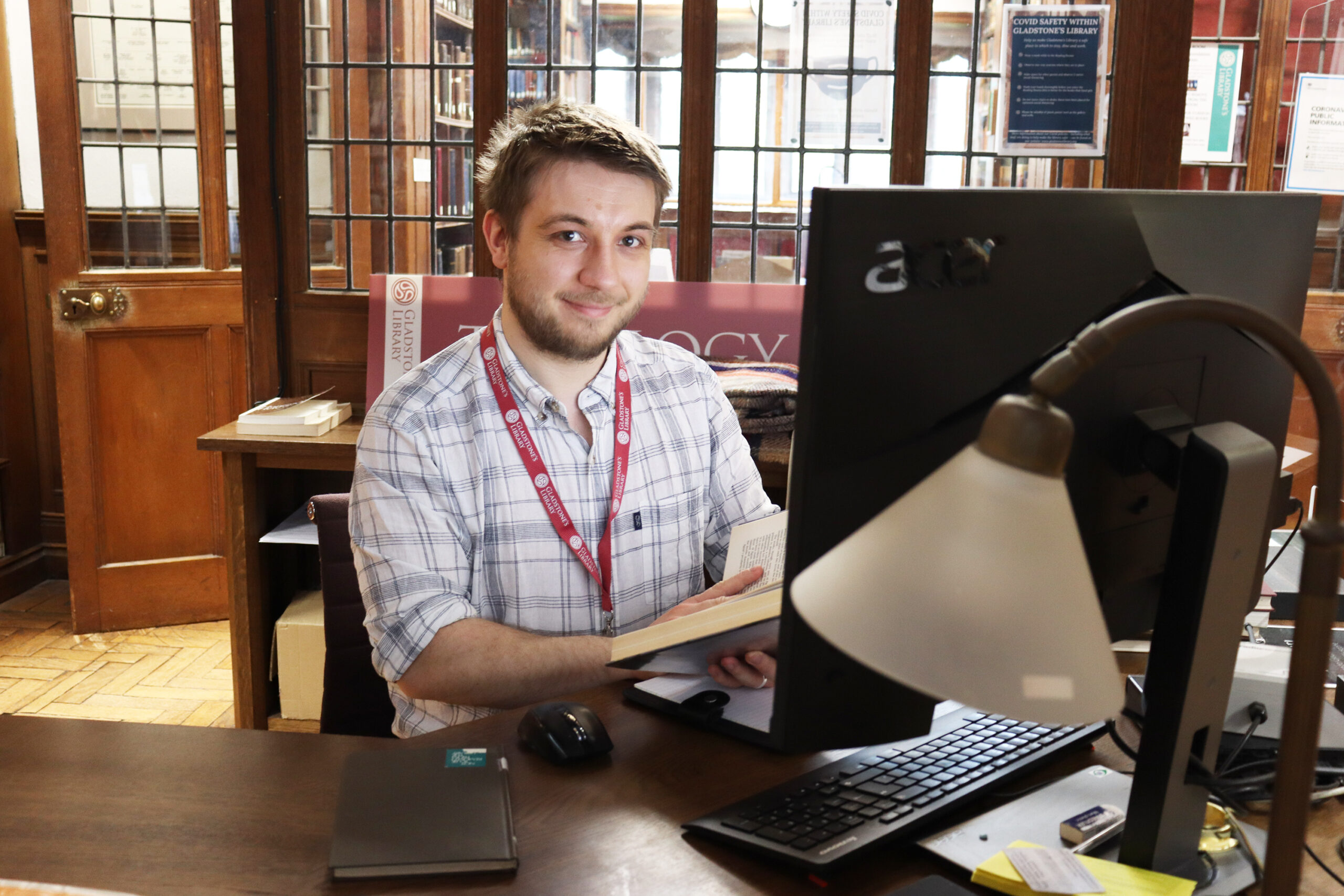Hi, I’m James. I work here at Gladstone’s Library as a Reading Room Assistant and I am dyslexic.
British Dyslexia Association Dyslexia Week 2022 runs until Sunday 9th October, with the theme of “Breaking Through Barriers”.
For Dyslexia Week I would like to tell you a little about me, my dyslexia, and what it’s like to work around words and in an environment that revolves around order and information when you have a condition that leads to problems with information sequencing.
Having dyslexia and working in a library could seem a bit of a contradiction. After all, one of the best-known symptoms of dyslexia is a difficulty with spelling, reading, and writing.
Read on and I will tell you how I manage these obstacles and what measures have been put in place to make our collections more accessible.
I was suspected of having dyslexia while in primary school and was diagnosed in my first year of high school. The diagnosis was reconfirmed by later evaluations including when I studied BA History at Glyndwr University.
Having dyslexia means I can find it hard to remember and conduct a sequence of directions or instructions.
In the Library, all of our tasks require following a workflow carefully and precisely, like deaccessioning books (where you have to go through set steps of retrieving a book, finding the classmark, finding the book on the catalogue, taking those catalogue details, cross-referencing them and importing them onto a spreadsheet, and updating them correctly). Obviously, I want to get these things right and treat the items in our collection with the upmost care, down to the last detail.
This can be difficult for me and so often takes more time and effort than it may for my colleagues. I may also have to double check instructions others would pick up on the first time. This is especially so with written instructions. I sometimes lose letters or word orders – this is why dyslexics commonly find it easier to follow verbal directions. This is tied in with problems with concentration (the extra cognitive load can be tiring) which affects my ability to hold uninterrupted focus on one task.
There are ways to manage this. For instance, I perform some tasks in short bursts each day to make sure I do not burn out and miss details.
I implement time budgeting and task-switching, such as taking a break from staring at a piece of paper (sometimes letters in the archive feature particularly curly handwriting!) to reshelve books every so often.
Thankfully there are always jobs that require a bit of movement around the Reading Rooms. Reshelving books is actually one of my favourite things to do – it’s satisfying to see a full shelf with every book back in place! My colleagues are helpful and willing to support me by running through tasks until I’m confident I can carry out the job independently. 
Picture shows Reading Rooms Assistant James at work on the Enquiry Desk.
My spelling and handwriting can be inconsistent, but believe it or not, spelling is not a huge difficulty. Most written work by Reading Room staff is done on a computer so it is simply a case of spell checking and carrying out a careful proofread before a blog goes out.
Problems with handwriting can affect my workflow, however, as part of the process of condition checking archives is writing clear, precise, and consistent item numbers on the items. To write this way requires quite a lot of concentration and effort for someone with dyslexia. The way I tackle this is by accepting that it may take me longer than it could take others and taking breaks from the task when I feel my standard slip.
Library workers do not actually spend any part of their day reading the books, though there are some tasks which require reading other types of documents for long periods. As I do struggle to read quickly, I normally listen to audiobooks at home.
The symptoms of dyslexia (and other people’s negative responses to them) can lead to people with dyslexia having poor self-confidence and low self-esteem.
If you want to support your dyslexic co-workers, employees, friends, and family, the most important thing to bear in mind is compassion. People with dyslexia are not lazy. We are often just as intelligent as everyone else; our brains just work differently.
With self-management and support from my colleagues at Gladstone’s Library, my dyslexia is managed well. Having dyslexia or another specific learning difficulty does not mean you cannot make use of library facilities – and it should not necessarily stop you finding a role in a library or a writing-related career if you want to follow that route!
Dyslexic Friendly summary
Blocks of texts can be difficult for those with dyslexia, so below is a bullet point summary of this article:
- I’m James.
- I have known I have had dyslexia since my first year of high school.
- I work in Gladstone’s Library
Here are some dyslexia symptoms that affect me:
- Finding it hard to remember a sequence of instructions, especially written ones.
- Concentration span problems.
- Spelling and handwriting can be inconsistent.
- Reading and writing can be slow.
- Low self-confidence stemming from issues caused by other symptoms.
How I manage my symptoms at work:
- Check instructions when I can to ensure I am performing a task correctly
- Perform tasks in bursts and switch tasks when I can feel my standard slip/concentration waning
- Change tasks to keep my brain engaged
- Budget time
- Write on a computer
- Take time with reading/writing tasks
Final thoughts: With self-management and support dyslexia shouldn’t get in the way of any career you want.
